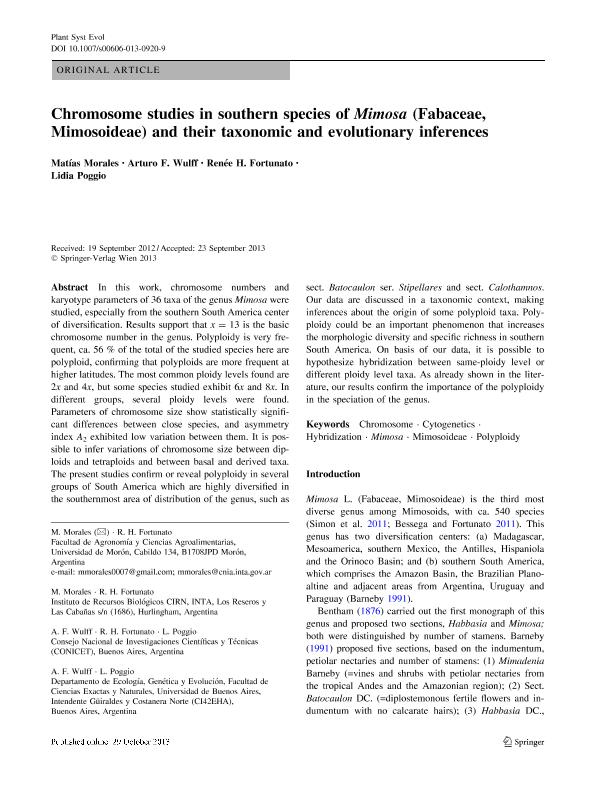Artículo
Chromosome studies in southern species of Mimosa (Fabaceae, Mimosoideae) and their taxonomic and evolutionary inferences
Fecha de publicación:
05/2014
Editorial:
Springer Wien
Revista:
Plant Systematics And Evolution
ISSN:
0378-2697
e-ISSN:
1615-6110
Idioma:
Inglés
Tipo de recurso:
Artículo publicado
Clasificación temática:
Resumen
In this work, chromosome numbers and karyotype parameters of 36 taxa of the genus Mimosa were studied, especially from the southern South America center of diversification. Results support that x = 13 is the basic chromosome number in the genus. Polyploidy is very frequent, ca. 56 % of the total of the studied species here are polyploid, confirming that polyploids are more frequent at higher latitudes. The most common ploidy levels found are 2x and 4x, but some species studied exhibit 6x and 8x. In different groups, several ploidy levels were found. Parameters of chromosome size show statistically signifi- cant differences between close species, and asymmetry index A2 exhibited low variation between them. It is possible to infer variations of chromosome size between diploids and tetraploids and between basal and derived taxa. The present studies confirm or reveal polyploidy in several groups of South America which are highly diversified in the southernmost area of distribution of the genus, such as sect. Batocaulon ser. Stipellares and sect. Calothamnos. Our data are discussed in a taxonomic context, making inferences about the origin of some polyploid taxa. Polyploidy could be an important phenomenon that increases the morphologic diversity and specific richness in southern South America. On basis of our data, it is possible to hypothesize hybridization between same-ploidy level or different ploidy level taxa. As already shown in the literature, our results confirm the importance of the polyploidy in the speciation of the genus.
Palabras clave:
Chromosome
,
Cytogenetics
,
Hybridization
,
Mimosa
Archivos asociados
Licencia
Identificadores
Colecciones
Articulos(OCA CIUDAD UNIVERSITARIA)
Articulos de OFICINA DE COORDINACION ADMINISTRATIVA CIUDAD UNIVERSITARIA
Articulos de OFICINA DE COORDINACION ADMINISTRATIVA CIUDAD UNIVERSITARIA
Citación
Morales, Matias; Wulff, Arturo Federico; Fortunato, Renee Hersilia; Poggio, Lidia; Chromosome studies in southern species of Mimosa (Fabaceae, Mimosoideae) and their taxonomic and evolutionary inferences; Springer Wien; Plant Systematics And Evolution; 300; 5; 5-2014; 803-817
Compartir
Altmétricas




